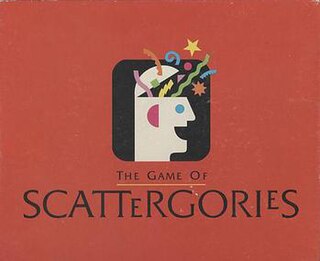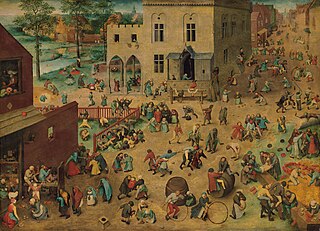Related Research Articles

Sternhalma, commonly known as Chinese checkers or Chinese chequers, is a strategy board game of German origin which can be played by two, three, four, or six people, playing individually or with partners. The game is a modern and simplified variation of the game Halma.

Pictionary is a charades-inspired word-guessing game invented by Robert Angel with graphic design by Gary Everson and first published in 1985 by Angel Games Inc. Hasbro purchased the rights in 1994 after acquiring the games business of Western Publishing before eventually selling the rights to Mattel. The game is played in teams with players trying to identify specific words from their teammates.

Simon Says is a children's game for three or more players. One player takes the role of "Simon" and issues instructions to the other players, which should be followed only when prefaced with the phrase "Simon says". Players are eliminated from the game by either following instructions that are not immediately preceded by the phrase, or by failing to follow an instruction which does include the phrase "Simon says". It is the ability to distinguish between genuine and fake commands, rather than physical ability, that usually matters in the game; in most cases, the action just needs to be attempted. In many regions of the United States Simon says is also known as “Simon Sez”.
In video games, a power-up is an object that adds temporary benefits or extra abilities to the player character as a game mechanic. This is in contrast to an item, which may or may not have a permanent benefit that can be used at any time chosen by the player. Although often collected directly through touch, power-ups can sometimes only be gained by collecting several related items, such as the floating letters of the word 'EXTEND' in Bubble Bobble. Well known examples of power-ups that have entered popular culture include the power pellets from Pac-Man and the Super Mushroom from Super Mario Bros., which ranked first in UGO Networks' Top 11 Video Game Powerups.
The fog of war is the uncertainty in situational awareness experienced by participants in military operations. The term seeks to capture the uncertainty regarding one's own capability, adversary capability, and adversary intent during an engagement, operation, or campaign. Military forces try to reduce the fog of war through military intelligence and friendly force tracking systems. The term is also used to define uncertainty mechanics in wargames.
Johnny Nolan Robinson is a former American football safety. He played college football at Louisiana State University (LSU).

Cheat is a card game where the players aim to get rid of all of their cards. It is a game of deception, with cards being played face-down and players being permitted to lie about the cards they have played. A challenge is usually made by players calling out the name of the game, and the loser of a challenge has to pick up every card played so far. Cheat is classed as a party game. As with many card games, cheat has an oral tradition and so people are taught the game under different names. The game is called "I Doubt It" by Edmond Hoyle and is sometimes known as "Bullshit" or "Bologna" in the United States.
Catch Phrase is a word guessing party game commercially available from Hasbro.

Arrow keys or cursor movement keys are buttons on a computer keyboard that are either programmed or designated to move the cursor in a specified direction. The term "cursor movement key" is distinct from "arrow key" in that the former term may refer to any of various keys on a computer keyboard designated for cursor movement, whereas "arrow keys" generally refers to one of four specific keys, typically marked with arrows.

Eugene William Shue is an American retired professional basketball player and coach in the National Basketball Association (NBA). Shue was one of the top guards of the early days of the NBA and an influential figure in the development of basketball. He is credited with inventing the "Spin Move" while being an early harbinger of other plays and strategies. Shue was an NBA All-Star five consecutive times (1958–62). After his successful playing career, he became a long-serving coach, twice winning NBA Coach of the Year. Throughout his career as player, coach, and executive, Shue was "a specialist at taking over faltering teams."

Ronald Michael Luciano was an American Major League Baseball umpire from 1969 to 1979 in the American League. He was known for his flamboyant style, clever aphorisms, and a series of published collections of anecdotes from his colorful career.

John Phalen "Stuffy" McInnis was a first baseman and manager in Major League Baseball.

Scattergories is a creative-thinking category-based party game originally published by Parker Brothers in 1988. Parker Brothers was purchased by Hasbro a few years later, and they published the game internationally under their Milton Bradley brand. The objective of the 2-to-6-player game is to score points by uniquely naming objects within a set of categories, given an initial letter, within a time limit. The game is based on a traditional game known as Tutti Frutti, Jeu du Baccalauréat, Stadt Land Fluss, and many other names.

Buck buck is a children's game with several variants. One version of the game is played when "one player climbs another’s back" and the climber guesses "the number of certain objects out of sight." Another version of the game is played with "one group of players [climbing] on the backs of a second group in order to build as large a pile as possible or to cause the supporting players to collapse."
Traditional Filipino Games or Indigenous games in the Philippines are games commonly played by children, usually using native materials or instruments. In the Philippines, due to limited resources of toys for Filipino children, they usually invent games without the need of anything but the players themselves. Their games' complexity arises from their flexibility to think and act.

Conspirateurs is a two- or four-player strategy board game probably invented in 18th-century France. It perhaps dates after 1789 from the French Revolutionary Wars, "a period of feverish political activity with factions conspiring against each other".
Jackbox Games, Inc. is an American video game developer based in Chicago, Illinois, best known for the You Don't Know Jack series of quiz-based party video games. Founded by Harry Nathan Gottlieb, the company operated as Jellyvision Games from 1995 until its closure in 2001. After seven years of dormancy, Jellyvision Games was revived in 2008, and the company rebranded as Jackbox Games in 2013.
This list includes terms used in video games and the video game industry, as well as slang used by players.
The Jackbox Party Pack is a series of party video games developed by Jackbox Games for many different platforms on a near-annual release schedule since 2014. Each installation contains five or so games that are designed to be played in large groups, including in conjunction with streaming services like Twitch which provide a means for audiences to participate.

Zwicken is an old Austrian and German card game for 4 to 6 players, which is usually played for small stakes and makes a good party game. It is one of the Rams group of card games characterised by allowing players to drop out of the current game if they think they will be unable to win any tricks or a minimum number of tricks.
References
- ↑ Aycox, Frank; Frank Alexander (1985). Games we should play in school: a revealing analysis of the social forces in the classroom and a practical approach to understanding and shaping them including over 55 dynamic and fun social games. Front Row Experience. pp. 69–70. ISBN 978-0-915256-16-7.
- ↑ Cratty, Bryant J. (1974). Learning about human behavior through active games . Prentice-Hall. pp. 197–199. ISBN 978-0-13-527473-6.